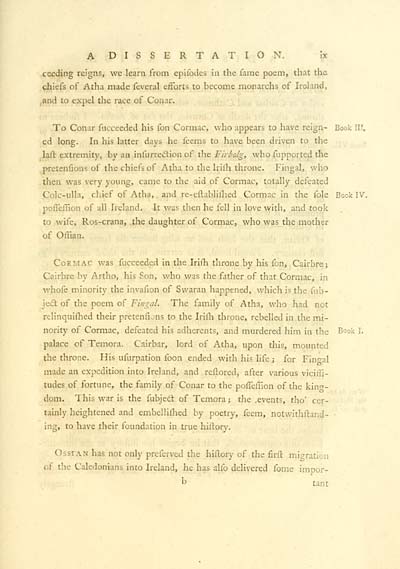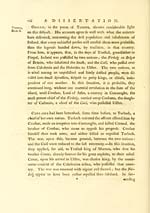Download files
Complete book:
Individual page:
Thumbnail gallery: Grid view | List view

A DISSERTATION. Ix
ceeding reigns, we learn from epitbdes in the fame poem, that the
chiefs of Atha made feveral efforts to become monarchs of Ireland,
and to expel the race of Conar.
To Conar fucceeded his fon Cormac, who appears to have reign- Book in.
ed long. In his latter days he fcems to have been driven to the
laft extremity, by an infurredlion of the Firbolg, who fupported the
pretenfions of the chiefs of Atha to the Irilh throne. Fingal, v^'ho
then was very young, came to the aid of Cormac, totally defeated
Colc-ulla, chief of Atha, and re-eflabliihed Cormac in the fole Book IV,
poffeffion of all Ireland. It was then he fell in love with, and took
to wife, Ros-crana, the daughter of Cormac, who was the mother
of Offian.
Cormac was fucceeded in the IriOi throne by his fon, Cairbre;
Cairbre by Artho, his Son, who was the father of that Cormac, in
whofe minority the invafion of Swaran happened, which is the fub-
ject of the poem of Fingal. The family of Atha, who had not
relinquifhed their pretenfuns to the Irifli throne, rebelled in the mi-
nority of Cormac, defeated his adherents, and murdered him in the Book I.
palace of Temora. Cairbar, lord of Atha, upon this, mounted
the throne. His ufurpation foon ended with his hfe ; for Fingal
made an expedition into Ireland, and reflored, after various vicifli-
tudes of fortune, the family of Conar to the poffeffion of the king-
dom. This war is the fubjedl of Temora; the .events, tho' cer-
tainly heightened and embellilhed by poetry, feem, notwithftand-
ing, to have their foundation in true hillory.
OssrAN has not only preferved the hiftory of the firft migration
of the Caledonians into Ireland, he has alfo delivered fome impor-
t> tant
ceeding reigns, we learn from epitbdes in the fame poem, that the
chiefs of Atha made feveral efforts to become monarchs of Ireland,
and to expel the race of Conar.
To Conar fucceeded his fon Cormac, who appears to have reign- Book in.
ed long. In his latter days he fcems to have been driven to the
laft extremity, by an infurredlion of the Firbolg, who fupported the
pretenfions of the chiefs of Atha to the Irilh throne. Fingal, v^'ho
then was very young, came to the aid of Cormac, totally defeated
Colc-ulla, chief of Atha, and re-eflabliihed Cormac in the fole Book IV,
poffeffion of all Ireland. It was then he fell in love with, and took
to wife, Ros-crana, the daughter of Cormac, who was the mother
of Offian.
Cormac was fucceeded in the IriOi throne by his fon, Cairbre;
Cairbre by Artho, his Son, who was the father of that Cormac, in
whofe minority the invafion of Swaran happened, which is the fub-
ject of the poem of Fingal. The family of Atha, who had not
relinquifhed their pretenfuns to the Irifli throne, rebelled in the mi-
nority of Cormac, defeated his adherents, and murdered him in the Book I.
palace of Temora. Cairbar, lord of Atha, upon this, mounted
the throne. His ufurpation foon ended with his hfe ; for Fingal
made an expedition into Ireland, and reflored, after various vicifli-
tudes of fortune, the family of Conar to the poffeffion of the king-
dom. This war is the fubjedl of Temora; the .events, tho' cer-
tainly heightened and embellilhed by poetry, feem, notwithftand-
ing, to have their foundation in true hillory.
OssrAN has not only preferved the hiftory of the firft migration
of the Caledonians into Ireland, he has alfo delivered fome impor-
t> tant
Set display mode to: Large image | Transcription
Images and transcriptions on this page, including medium image downloads, may be used under the Creative Commons Attribution 4.0 International Licence unless otherwise stated. ![]()
| Early Gaelic Book Collections > Ossian Collection > Critical dissertation on the poems of Ossian, the son of Fingal > (19) |
|---|
| Permanent URL | https://digital.nls.uk/77431802 |
|---|
| Description | Selected books from the Ossian Collection of 327 volumes, originally assembled by J. Norman Methven of Perth. Different editions and translations of James MacPherson's epic poem 'Ossian', some with a map of the 'Kingdom of Connor'. Also secondary material relating to Ossianic poetry and the Ossian controversy. |
|---|
| Description | Selected items from five 'Special and Named Printed Collections'. Includes books in Gaelic and other Celtic languages, works about the Gaels, their languages, literature, culture and history. |
|---|

